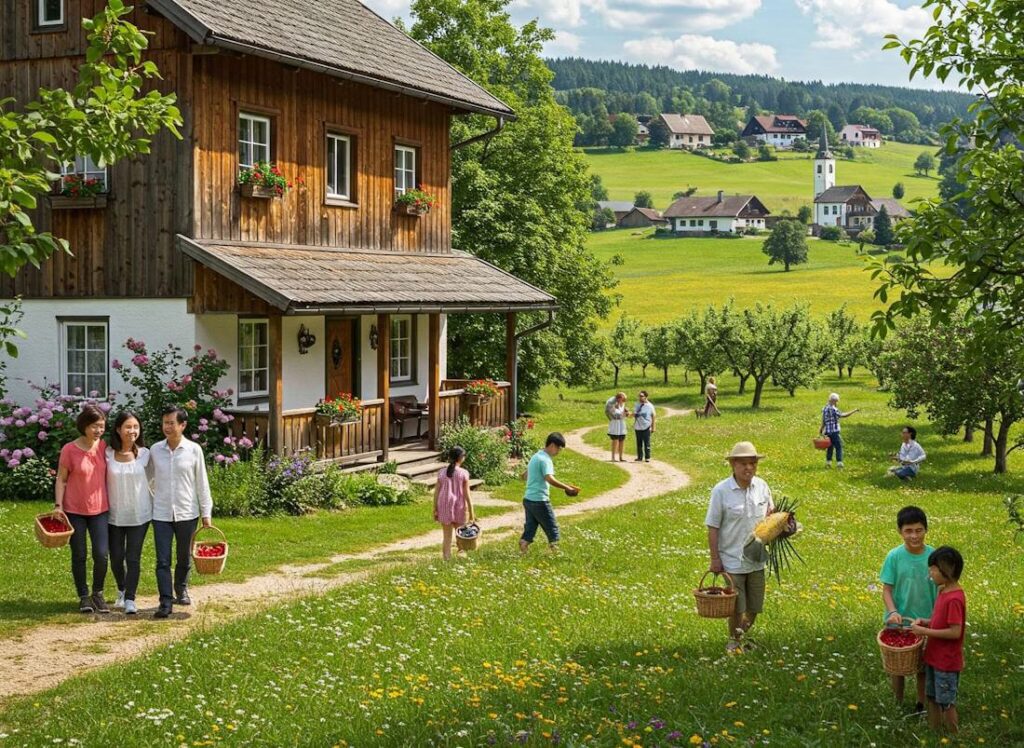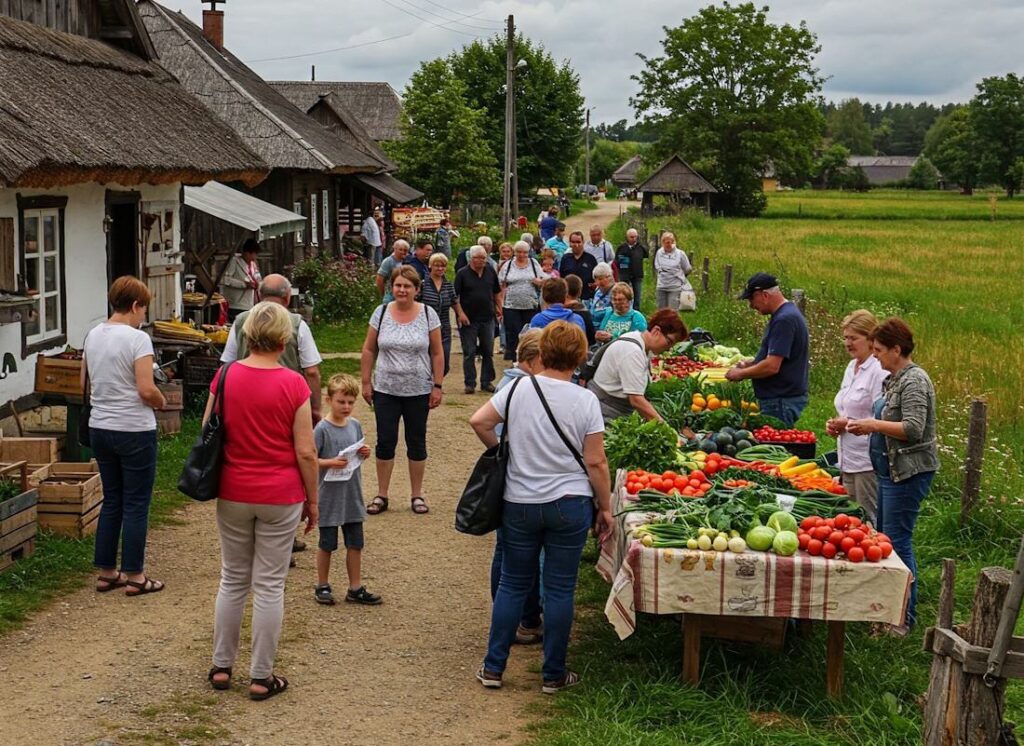Rural tourism refers to the range of activities and experiences that allow visitors to engage with rural environments, cultures, and traditions. This form of tourism encompasses a variety of experiences such as agritourism, eco-tourism, rural lodging, and cultural exchanges, all of which aim to showcase the unique aspects of rural living. As urban populations continue to grow, the significance of rural tourism is becoming more pronounced, offering an alternative to the conventional urban-centric travel experiences.
The importance of rural tourism in today’s tourism landscape cannot be overstated. With increasing urbanization and a growing desire for authentic experiences, rural areas are well-positioned to attract travelers seeking to explore untouched locations and engage with local traditions. This sector not only contributes to preserving local cultures but also offers economic opportunities for rural communities, allowing them to maintain their heritage while benefiting from tourism initiatives. Consequently, rural tourism has emerged as a potential area of growth for innovative entrepreneurs.
Statistics illustrate the promising growth potential of this sector. According to recent studies, rural tourism is expected to grow significantly, with projections indicating a compound annual growth rate of over 10% in the coming years. Additionally, the COVID-19 pandemic has shifted traveler preferences towards domestic and rural destinations as safety and social distancing become priorities. This trend has further propelled rural tourism into the spotlight as both a viable business venture and a sustainable option for environmental conservation.
As more entrepreneurs recognize the opportunities presented by rural tourism, the sector is becoming a focal point for business development. By tapping into the unique resources and experiences that rural areas offer, aspiring business owners can create impactful and sustainable ventures that not only enhance tourism but also enrich local communities.
The Shift in Travel Preferences
In recent years, there has been a notable evolution in consumer behavior related to travel, particularly highlighted by a significant shift from urban tourism to more rural destinations. This change is indicative of a growing desire among travelers for authentic experiences that allow them to escape the hustle and bustle of crowded city centers. As individuals increasingly seek respite from their fast-paced lifestyles, rural tourism has emerged as a promising alternative, emphasizing the natural beauty and unique cultural offerings of less commercialized regions.
The COVID-19 pandemic served as a catalyst for this trend, as restrictions and safety concerns led many to reconsider their travel preferences. With urban areas often facing the highest rates of contagion, travelers became more cautious and began to explore options that offered safety, tranquility, and a connection to nature. This collective hesitance toward densely populated environments has resulted in a rising interest in outdoor activities, agritourism, and cultural immersion, all of which are hallmarks of rural destinations. Entrepreneurs in these areas can capitalize on this shift by developing experiences that promote outdoor adventures, local cuisine, and sustainable practices.
Moreover, as travelers increasingly yearn for meaningful connections, rural tourism presents unique opportunities to engage with local communities and cultures. Visitors are now more inclined to support small businesses, artisanal producers, and community-focused initiatives, fostering a sense of belonging and genuine interaction. By embracing this evolving preference, entrepreneurs can innovate and diversify their offerings, providing experiences that resonate with the values of contemporary consumers. From eco-friendly accommodations to culturally immersive workshops, the scope for creativity in rural tourism is vast, making it an attractive consideration for those looking to invest in the travel sector.
Business Opportunities in Rural Tourism
Rural tourism presents a diverse array of entrepreneurial opportunities, inviting ventures that cater to the unique aspects of rural life and natural landscapes. Among the rising niches in this sector are agritourism, eco-tourism, cultural tourism, and adventure tourism. Each of these areas not only allows for substantial business growth but also emphasizes sustainability and community engagement.
Agritourism is perhaps one of the most accessible forms of rural tourism for entrepreneurs, involving activities that attract visitors to farms and agricultural settings. This can include farm stays, tours, and even participation in farming activities. The initial investment may vary depending on the scale of the operation, but the potential returns are significant, especially as consumers increasingly seek authentic experiences linked to their food sources. Skills in hospitality and knowledge of agricultural practices can greatly enhance the success in this area.
Eco-tourism offers another promising venture for entrepreneurs, focusing on environmentally responsible travel to natural areas. This type of tourism emphasizes conservation efforts, and as a result, it can create opportunities for eco-lodges, guided nature tours, and outdoor adventure experiences. The required investment often includes the development of infrastructure that minimizes environmental impact. Entrepreneurs with expertise in environmental science and a passion for conservation can find great success here.
Cultural tourism is a niche that capitalizes on the unique heritage, traditions, and customs of rural communities. This can involve setting up cultural exhibitions, workshops, or events that attract visitors interested in authentic cultural exchanges. While the initial investment in such endeavors may vary, the potential for return is promising, especially in regions with rich cultural histories. Skills in cultural preservation and event management are essential for entrepreneurs venturing into this field.
Lastly, adventure tourism in rural areas provides opportunities for entrepreneurs to develop activities such as hiking, biking, or water sports. This sector has been expanding, driven by a growing interest in outdoor adventures. Investment may encompass equipment, safety measures, and infrastructure. Those with knowledge in outdoor recreation and safety management are well-suited to thrive in this market. Each of these niches in rural tourism offers distinct opportunities, with the potential for profitability while contributing positively to rural communities.
Challenges in Establishing Rural Tourism Ventures
Establishing a rural tourism business can be an enticing prospect for entrepreneurs, yet it is fraught with challenges that must be addressed for success. One predominant issue is the lack of adequate infrastructure in rural areas. Many regions might struggle with insufficient transportation networks, limited access to utilities, and subpar internet connectivity. These factors can hinder the travel experience for tourists, making it essential for entrepreneurs to either improve existing infrastructure or collaborate with local governments to develop it.
Access to funding is another significant hurdle. Rural tourism ventures often find it difficult to secure investment compared to their urban counterparts. This can stem from a perceived risk associated with rural businesses which may not attract as many visitors as more lucrative urban destinations. Entrepreneurs may need to explore various funding avenues, including grants specifically targeted at rural developments or crowdfunding campaigns, to alleviate these financial constraints.
Marketing poses its own set of challenges within rural tourism. Entrepreneurs may lack the resources or expertise to effectively promote their offerings, which can lead to low visibility in a competitive marketplace. Leveraging digital marketing strategies, emphasizing unique local attractions, and engaging with travel influencers can help overcome this barrier. Furthermore, forming partnerships with existing local businesses can enhance exposure and create a more cohesive tourism experience for visitors.
Lastly, implementing sustainable practices in rural tourism is essential but can also prove challenging. Entrepreneurs are often tasked with balancing growth and environmental stewardship. Adopting eco-friendly practices, while appealing to an increasingly environmentally conscious consumer base, requires careful planning and investment. Real-life examples, such as the eco-lodges in the Appalachian region, demonstrate the necessity of integrating sustainability to ensure the long-term viability of tourism ventures.
Success Stories: Entrepreneurs Who Made It Work
Rural tourism has emerged as a promising avenue for entrepreneurship, with several notable success stories illustrating its potential. One such entrepreneur, Laura Hewitt, transformed her family’s farmhouse in a picturesque countryside into a boutique bed-and-breakfast. By leveraging the local heritage and offering unique experiences such as farm-to-table dining and guided nature walks, she successfully attracted both local and international visitors. Laura’s commitment to sustainability has also resonated well with eco-conscious travelers, helping her business thrive.
Another exemplary case is that of James and Sarah Thompson, who started a craft workshop in their small rural community. Recognizing the talents of local artisans, they created a space where visitors could participate in hands-on crafting sessions. By integrating local culture and crafts, they not only diversified their revenue streams but also fostered a sense of community among participants. Their workshops have seen a steady rise in popularity, resulting in collaborations with travel agencies that promote rural experiential packages.
In a different domain, Michael Chen ventured into rural glamping, setting up luxury tent accommodations amidst the stunning landscapes of the countryside. This innovative approach blended outdoor adventure with comfort, appealing to urban travelers seeking a quick retreat from city life. Michael’s business model has successfully addressed the growing demand for experiential travel while promoting local attractions such as hiking trails and scenic views. His story serves as a testament to the viability of combining modern business practices with traditional tourism elements.
These case studies serve as evidence that rural tourism presents significant entrepreneurial opportunities. By capitalizing on local assets and engaging visitors through unique and tailored experiences, entrepreneurs can create sustainable business models that significantly benefit their communities. The success of these ventures highlights not only individual determination but also the rich potential of rural areas as attractive destinations for diverse tourist demographics.
Marketing Strategies for Rural Tourism
Effectively promoting rural tourism is crucial for entrepreneurs seeking to capitalize on the growing interest in authentic, nature-based travel experiences. A robust marketing strategy that combines traditional and digital techniques can help businesses reach their target audience efficiently. First and foremost, developing a strong brand identity plays a vital role in distinguishing rural tourism ventures from competitors. This includes crafting a compelling value proposition that highlights the unique offerings of a location, such as local culture, scenic landscapes, and recreational activities.
In addition to branding, digital marketing is an essential component for rural tourism entrepreneurs. Utilizing a well-designed website that showcases offerings, including lodgings, activities, and experiences, is vital in today’s digital world. Search engine optimization (SEO) should be implemented, ensuring that relevant keywords tied to rural tourism are seamlessly integrated into the website content to enhance visibility in search engine results.
Social media campaigns are another powerful tool for promoting rural tourism. Platforms like Instagram, Facebook, and TikTok enable entrepreneurs to engage with potential travelers through visual content and storytelling. Consistently posting authentic images and videos of the experiences travelers can expect, along with user-generated content, can significantly boost interest. Collaborating with local businesses for cross-promotional efforts will not only expand reach but also create a sense of community among local stakeholders.
Furthermore, leveraging online travel agencies (OTAs) allows rural tourism entrepreneurs to tap into established customer bases. By listing accommodations and activities on platforms known for promoting various travel experiences, entrepreneurs can attract a broader audience seeking rural adventures. Additionally, targeting specific demographics, such as eco-conscious travelers or families, through tailored marketing initiatives can optimize outreach and effectiveness.
The Role of Community and Collaboration
Community engagement and collaboration are integral to the success and sustainability of rural tourism. By fostering partnerships among local businesses, government entities, and residents, rural communities can enhance tourism experiences while promoting sustainable growth. The collaborative approach enables stakeholders to pool resources, share knowledge, and create a more vibrant tourism ecosystem that benefits everyone involved.
One promising aspect of community-led initiatives is the ability to showcase local culture, heritage, and natural resources. When businesses and residents work together, they can develop unique offerings that appeal to tourists seeking authentic experiences. For instance, a local farm may collaborate with nearby inns to create farm-to-table dining experiences, attracting visitors who appreciate locally sourced food. Such partnerships not only enrich the tourist experience but also strengthen local economies, encouraging consumers to spend money within the community.
Furthermore, government support can play a pivotal role in fostering collaboration. Local authorities can establish programs that encourage businesses and residents to come together, offering incentives for joint marketing efforts or community events. This approach not only promotes the destination but also helps build strong relationships among community members. For example, jointly organized festivals can highlight local talents, arts, and crafts, making the area more appealing to tourists and providing a platform for locals to showcase their skills.
In addition, a collaborative strategy can lead to better resource management, ensuring that tourism growth does not come at the expense of the environment or local quality of life. When community members actively participate in decision-making processes related to tourism development, they are more likely to advocate for sustainable practices that protect their natural surroundings. This alignment between community values and tourism goals creates a beneficial cycle, ultimately enhancing rural tourism while preserving the essence of the community.
Future Trends in Rural Tourism
As we look towards the future, several emerging trends are poised to reshape the landscape of rural tourism, presenting new opportunities for entrepreneurs in this sector. One significant trend is the rise of remote work tourism, which has gained momentum due to the increase in flexible work arrangements. Many professionals are seeking destinations outside urban centers, where they can combine work with leisure in tranquil rural settings. This shift not only supports local economies but also promotes longer stays, allowing travelers to fully engage with the rural community.
Sustainability practices are another crucial focus for future rural tourism development. As environmental awareness continues to grow, travelers are increasingly looking for eco-friendly options. Entrepreneurs who incorporate sustainable practices, such as organic farming, conservation efforts, and responsible waste management, can attract conscious consumers who prioritize ethical travel experiences. Furthermore, local sourcing and offering educational experiences about sustainable living further enhance the appeal of rural tourism.
The integration of technology within rural experiences is also becoming more prevalent. From mobile apps that facilitate farm-to-table dining experiences to virtual reality tours of local attractions, technology is making it easier for rural destinations to reach broader audiences. Moreover, seamless online booking systems and digital marketing strategies can help rural tourism businesses compete with established urban counterparts, fostering growth in this market.
Shifts in traveler demographics are equally noteworthy; younger generations are increasingly drawn to the authenticity and adventure that rural tourism offers. Millennials and Gen Z travelers prioritize experiences over traditional luxury, favoring immersive activities such as hiking, farming, and participating in local cultural events. As these demographics become more prominent, entrepreneurs must adapt their offerings to meet the evolving demands and interests of today’s travelers.
Conclusion: Embracing Opportunities in Rural Tourism
In examining the evolution of travel trends and consumer preferences, it becomes evident that rural tourism is gaining significant traction as a burgeoning entrepreneurial opportunity. The shift towards sustainable and nature-based travel experiences has opened new avenues for aspiring business owners in rural areas. Entrepreneurs can capitalize on the growing demand for authentic experiences, which often include local culture, gastronomy, and outdoor activities. This focus aligns well with the current societal values surrounding sustainability and wellness, further solidifying rural tourism’s potential.
Moreover, the rise of digital platforms and social media has made it easier for businesses operating in rural areas to reach wider audiences. By leveraging technology, entrepreneurs can effectively market their unique offerings, share compelling stories from the countryside, and attract visitors looking for experiences that differ from traditional urban tourism. Additionally, the government and various organizations are increasingly supporting rural development initiatives, providing incentives and resources that can significantly aid new ventures in the tourism sector.
Furthermore, rural tourism promotes community engagement and skills development, which can create a positive impact on local economies. By investing in rural tourism ventures, entrepreneurs not only seek financial gain but also contribute to the social fabric and revitalization of their communities. This dual benefit enhances the appeal of rural tourism as a viable path for sustainable business practices. Aspiring entrepreneurs are encouraged to explore these opportunities and consider how their unique insights, combined with a passion for rural locales, can lead to innovative tourism solutions.
In summary, the potential of rural tourism as an entrepreneurial venture is vast. As consumer interests continue to align with the offerings of remote destinations, there has never been a better time for entrepreneurs to engage with this growing market. By embracing the opportunities presented by rural tourism, individuals can not only establish successful businesses but also foster a renewed appreciation for the beauty and richness of rural life.



